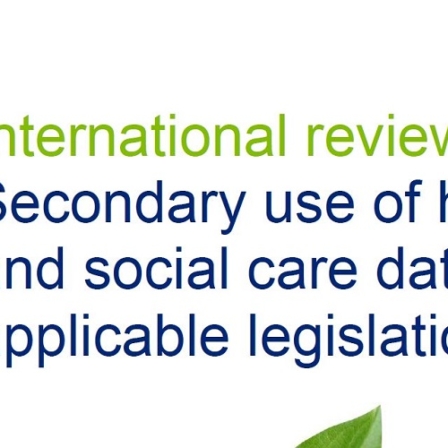Finland’s high-quality well-being data reserves are an unparalleled treasure trove. The Isaacus Digital Health Hub project, whose aim is to combine and effectively use these data reserves, can give Finland an advantage in the tough international competition for the management of well-being data. This might be inferred based on the recently published international comparison – Secondary use of health and social care data and applicable legislation – according to which there is currently no such digital health hub operator to be found anywhere in the world.
“A more seamless, secure use of data reserves is in everyone’s best interests,” explains Director Antti Kivelä of Sitra. “If secondary use of data can be provided in a flexible way, we will be a world leader in this regard. Services and innovations based on a new way of using data are a world megatrend, in which Finland’s small size and uniformity are strengths compared to our competitors.”
Data is an invaluable raw material for, among other things, research, product development, service development and for individuals themselves. A more flexible collection of data from various sources, for scondary use and analysis for example, can provide a springboard for many private and public organisations, which produce such things as targeted drug therapies, treatment and well-being services. In addition, citizens are given a new kind of role in the management of data.
Data use is promoted and the role of citizens is outlined in Sitra’s Digital Health Hub projects. Legislation on the secondary use of well-being data is currently being drafted by the Ministry of Social Affairs and Health. The role of the individual is also being taken into consideration in the National Architecture for Digital Services project (esuomi.fi), which is currently being prepared. The aim of the project is to make data reserves more accessible to citizens.
“Finnish registers aren’t being sold as is – the purpose of the Digital Health Hub will be to collect data from a variety of sources and provide the analysed data to whomever needs it, provided that they meet the separately specified conditions. Individuals can’t be identified by the data provided and they will be given an opportunity to see the studies in which their data is to be used. If necessary, they’ll also be able to deny the use of their data,” explains Kivelä.
International reports done by Sitra and the Ministry of Social Affairs and Health reinforce the image of the possibilities offered by Finland’s unique data reserves for research and innovation as well as for business intelligence in the social welfare and healthcare environment of the future.
“Legislation is currently being developed specifically to meet future needs, because our considerable data reserves are underutilised. Without up-to-date legislation, enterprises that facilitate research, development and innovation will never be realised or end up in other countries,” says Ministerial Adviser Hannu Hämäläinen of the Ministry of Social Affairs and Health.
“Finland needs a data-secure and agile service environment so that we can keep basic data secure while making it accessible for use in a controlled and needs-based manner. This also makes new legislation a competitive factor,” adds Hämäläinen. The bill on the use of social welfare and healthcare data will be completed in June.
The preparations for the launch of the Digital Health Hub have been under way since last year. The first Sitra pre-production project is being launched in the Hospital District of Helsinki and Uusimaa, where an open-source code data pool will be developed and built for the storage and use of large volumes of data.
Data on, for example, the quality and price of treatment services will be stored in the pool. The data pool provides patients with data as a basis for comparison, it gives researchers easier access to the data they need and it gives society the opportunity to develop decision-making based on data. The pool also provides companies with a platform and raw materials for product development. A call for projects was also used to select seven similar projects for completion. These projects are scheduled for launch in the near future.
The operating models and legislation for the secondary use of well-being data have been borrowed from all over the world. A recently published report compares operating models and legislation for the use of social welfare and healthcare data in the UK, the Netherlands, New Zealand, Israel, Canada and Australia. A Finnish summary of the report was also made. A Nordic comparison will be completed later.
Malene Højsted Kristensen, Head of Secretariat Health Data Programme (link in Danish) discusses the Danish model in a short video:
What is the Digital Health Hub?
- The Digital Health Hub is a one-stop-shop for well-being data.
- It is a national provider of well-being data for a variety of needs.
- It is a facilitator of well-being research, business and service development.
- It is a facilitator of key social welfare and healthcare services used by individuals.
- It is a data-secure, international and primarily public service.



Recommended